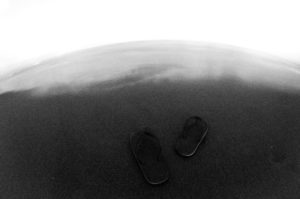I had three major heartbreaks.
1. My biological father left us when I was four.
2. My biological mother left me when I was five, came back when I was eleven and denied the fact that she was my mother at her church wedding with another man.
3. My first boyfriend cheated on me when I was sixteen.
The three may differ in gravity but all three broke me hard. All three experiences made me think of myself as someone unworthy of being loved. I felt as if I was not worthy of existing at all. My heart was completely broken.
Why do broken hearts go? That’s simple. They have experiences like the ones I had. They go because of one thing and one thing alone. They go because of PAIN.
Pain, of any level, makes our hearts desire to leave its current setting and search for a place that feels safer. We want to go to some place where everyone will fully understand us without judgment. We want to go to some place where nothing will break our trust again. We want to go somewhere we will be assured that everything happened for a logical reason. We want to go somewhere we will be reminded that eventually things will be okay. We want to go where other broken hearts go.
So let me tell you where I went and what I did when I felt broken. I hope that somehow you may also find refuge in these things like I did.
1. I cried.
I couldn’t count how many times I did but when I cried, I cried like I wouldn’t be given another day to cry again. Crying may have reminded me of the pain but the weight of my burden somehow felt lighter after the outburst of tears. Pope Francis said, “Let’s learn how to weep. Let us learn, really learn how to weep, how to cry.” He explained, “When the heart is unable to answer itself and cry, then we can understand.”
2. I kept a journal.
I wrote. I scribbled. I drew. Most of it didn’t make sense at first, like I was just stabbing the paper with my pen. But when you finally start to heal, you’ll know by the way you write. You’ll know because you kept track of your thoughts. You’ll know because you have made yourself tangible evidence that things do become better until they are completely okay.
3. I prayed and never stopped.
I questioned my God. I doubted His love for me but I never lost my faith. I kept on praying even though my prayers were full of bitterness and complaints. The God that I believe in is a God who loves us unconditionally. I am confident that He is a God who allows us to be angry at Him, to be bitter at Him, because we are human and we are able to feel pain. He is a God capable of empathizing to the very ways we respond to desolation. He is God and He understands.
In every pain, I am reminded that blessed are the broken hearted for they shall be comforted (Mt 5:4). The Lord is near to the broken hearted and saves those who are crushed in spirit (Ps 34:18). He heals the broken hearted and binds up their wounds (Ps 147:3).
We may not notice His ways and how He gives us comfort, but when we think about it, all the things that made us better were all of His design.
[second_picture]
4. I loved myself.
Loving one’s self entails a lot of things. I realized my real worth when I learned to love myself. I understood that all the pain that I have gone through and will go through, will not define how much love I deserve. I learned to forgive and understand. I learned that it is as much important to forgive and understand yourself as it is to forgive and understand the people who cause you pain. It is only when you know how to love yourself that you will be able to move on and live fully.
5. I went home.
Home is not just your house and your family. Home is any place or with anyone you know who can give you sense of belongingness. The home I meant is the home I feel with my family and friends, the home I feel with my religion and community, the home I feel with the beach and the mountains, the home I feel with my mentors and the home I feel with myself.
In this generation, we are often told that to be able to move on or to be able to find yourself, you’ll have to travel, escape and go away. There is truth in that but it is not entirely the solution. Always beware of what Robert Holden calls “destination addiction” which means a preoccupation with the idea that happiness is in the next place, the next job, and with the next partner. Until you give up the idea that happiness is somewhere else, it will never be where you are.



